'Sip and shop': The retailers tempting you in with alcohol
- Published
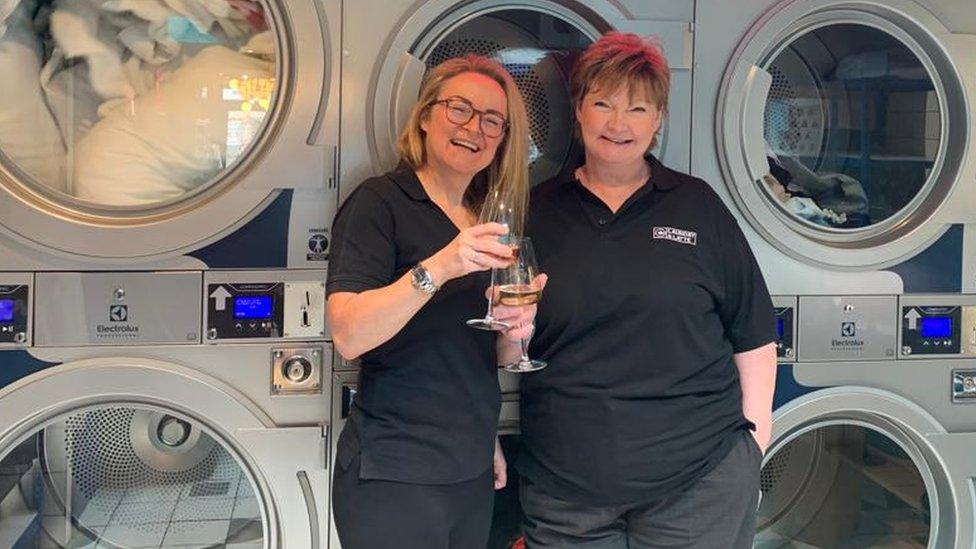
Sarah-Jane Adams and Dee Anderson wanted to make going to the launderette 'pleasurable'
Going to a laundrette to get your washing done is not most people's idea of fun, but two friends want to change that.
Sarah-Jane Adams and Dee Anderson are the co-founders of Laundry and Latte in the Essex town of Brentwood.
As its name suggests, their business combines both a laundry and a café. And better still, the venue is fully licenced, so you can even enjoy an alcoholic drink while you watch your clothing spin around.
"We wanted to make it welcoming, comfortable. We wanted to make doing laundry pleasurable," says Ms Adams.
"Recently, we had a mum come in who said 'it's been an awful week... oh you do wine!'. And she sat down and had a large glass of wine while we did her washing for her."
Opening its doors last autumn, Laundry and Latte is part of a small but growing trend on the UK High Street that is being dubbed "sip and shop". You can pop along to a retailer, or service provider such as hairdressers, and enjoy an alcoholic drink or two while you are there.
In turn, this is part of the wider "experience retail movement", whereby an increasing number of physical shops are deciding that they need to offer shoppers experiences other than just the opportunity to buy something, in order to woo them away from online shopping.
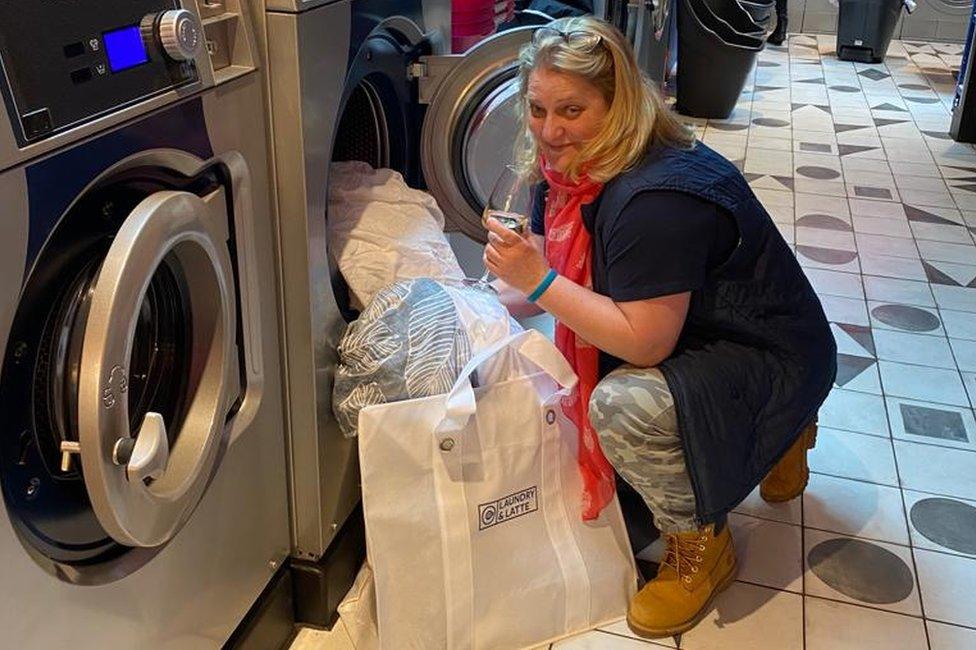
Customers at Laundry and Latte can enjoy a glass of wine while doing their laundry
The experiences on offer vary widely, ranging from a fashion store having staff who can help customers pick their clothes, to bands or DJs performing live.
Other experiences include make-up tutorials, book readings and talks, and areas where people can try before they buy.
By 2025, half of retail space will be dedicated to experiences, according to one report earlier this year, external. The study by shopping centre group Westfield said we are approaching "experience tipping point".
But given that alcohol-related deaths in England and Wales hit a 20-year high during the pandemic, should shops really be allowed to let customers to sip a drink while they shop? Could it encourage more excessive drinking?
Haylee Benton says that her combined florist shop and champagne bar Hanako caused some misunderstanding when it first opened in the Hertfordshire town of Berkhamsted.
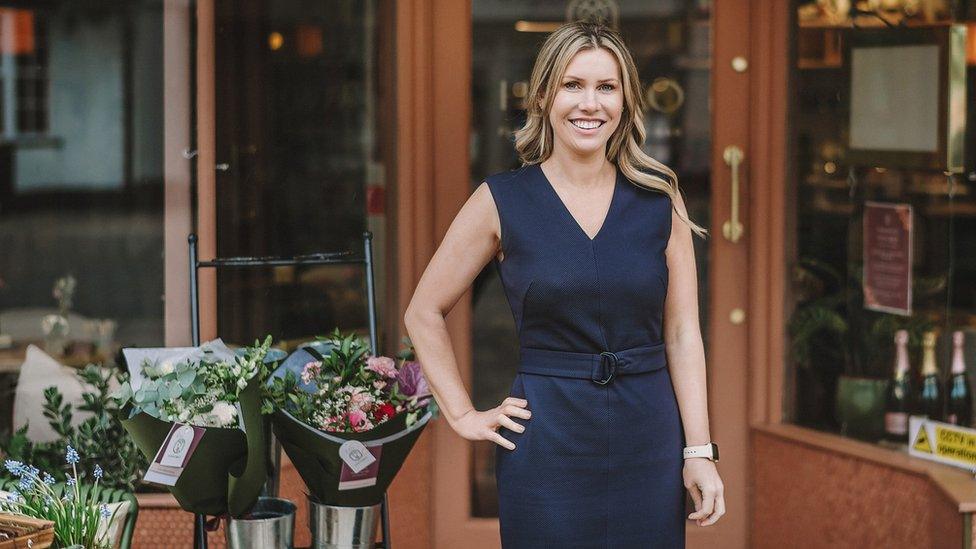
Haylee Benton says that many people initially didn't think that her business was a florist
"At first there was confusion about what it was," she says. "Everyone referred to it as a champagne bar, and thought the flowers were just for decoration. After three months, the concept finally started to click with people."
Ms Benton says Hanako is the world's first florist where you can have a glass of champagne while your bouquet is being made.
"I saw a gap in the market for people craving experiences," says the 33-year-old. She launched the business last year, and it also sells hot drinks, and other types of alcohol.
"A lot of men come for a coffee or beer whilst waiting for their flowers to be made," adds Ms Benton. "And our mother-daughter afternoon tea and floristry workshops are popular too. For us, it is all about the experience."
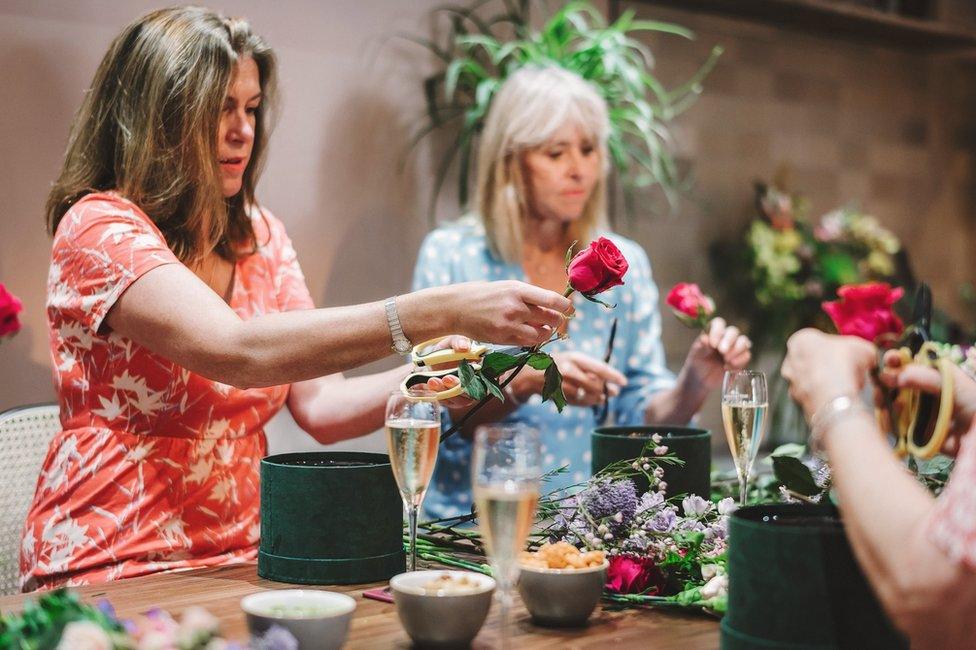
At Hanako the bouquets can be made while you enjoy a glass of champagne
Shops cannot simply start offering their customers alcoholic drinks, either for a fee, or free of charge. Instead they have to apply for a licence from their local authority.
To help their case they can employ the services of a firm of solicitors that specialise in licencing applications, such as Nottingham-based Poppleston Allen.
James Anderson, one of its partners, says they have seen a noticeable increase in sip and shop licence applications in recent months. "The younger generation, in particular, wants to do more than sitting around in a pub," he says ."They want to do something interesting at the same time as having a drink.
"We as a firm expect to be dealing with more of these licence applications over the next few years."


New Economy is a new series exploring how businesses, trade, economies and working life are changing fast.

Mr Anderson adds that any shop that sells alcohol without a licence "could be subject to an unlimited fine or closed down".
Chrissy Ryan founded London's BookBar in 2021. Bookbar hosts author events, runs a 200-member strong book club, and has "created a wine and coffee-loving community who come to socialise around books".
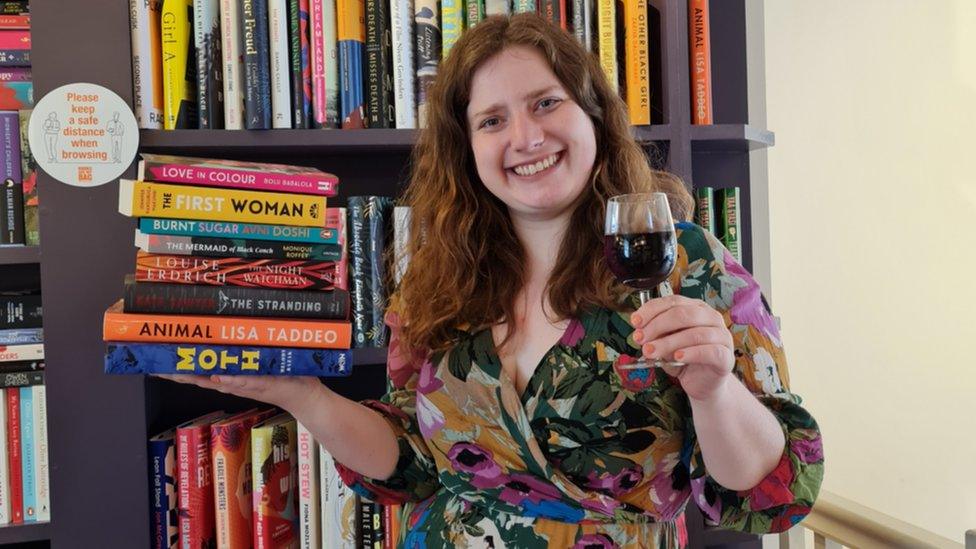
Chrissy Ryan wanted her book shop to become a community
"We launched during lockdown so we've had to be innovative from the beginning," she says.
Books make up 70% of Bookbar's sales, while the wine encourages people to linger for longer, to chat with the staff and receive book recommendations.
"We can shop for customers while they relax. Some people come for a glass of wine and leave with a pile of books. Others come for a book recommendation and end up staying for a glass of wine."
Ellie Kime, of north London, is a BookBar regular. "Somewhere that combines book recommendations, community and a place to meet friends is perfect," says the 25-year-old.
However, like many, Ms Kime's drinking habits changed during the pandemic. "During lockdown, I drank at home more frequently than pre-pandemic. It's definitely something I'm conscious of, but not something I'm actively worried about."
David Wilson, is an ambassador for charity Alcohol Change UK, which works to help problem drinkers, and raises awareness of the dangers of excessive alcohol consumption.
He warns that alcohol can make people more impulsive, and therefore more likely to make a purchase, or a bigger purchase, than they intended to.
"It's important to realise that this [sip and shop] benefits the store as much as it does the customer," he says. "It's all part of marketing."
Ms Kime says that while she has "never drunkenly booked a flight to another country or anything... I've almost certainly pressed checkout while drunk".